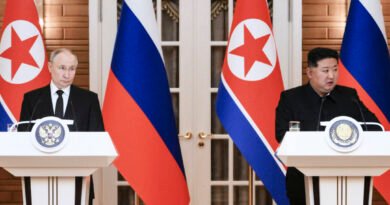Leaders of New Zealand experience chilly welcome as they attempt to eliminate unique indigenous legal rights.
During a recent meeting between government leaders and Māori, strong emotions of anger and resentment surfaced regarding a proposal to potentially alter the interpretation of the Treaty of Waitangi.
Top officials in the New Zealand government sat down on Aug. 19 with a pan-Māori movement that vehemently opposes the government’s attempts to eliminate what it perceives as preferential treatment based on race.
Despite occasional disagreements both between and within tribes on political matters, they stand united against a government that, since coming into power, has made significant changes to several agencies responsible for providing services exclusively to Māori.
Some criticize these actions as “racist,” while others view them as an attempt to restore a long-unbalanced equilibrium.
Among the controversial decisions made are the closure of the Māori Health Authority, significant staff reductions at the Office of Māori-Crown Relations, repealing a law requiring Māori fostered children to be placed with extended family, proposing legislation to outlaw gang patches, and planning to withdraw from the United Nations Declaration on the Rights of Indigenous Peoples.
Even the use of the Māori language in official correspondence has been restricted, as evidenced by the removal of specific Māori phrases in an invitation extended to Australia’s arts minister for the Māori festival of Matariki.
But the most contentious issue for Māori, one that has united them in strong opposition, is the proposed Treaty Principles Bill.
Differing Laws for Māori?
A brainchild of the ACT Party, part of New Zealand’s current tri-party government, the bill seeks to legally establish that the principles of the Treaty align with the actual content of its three articles.
The Treaty of Waitangi, signed between the Crown and many Māori leaders in 1840, is a relatively short document with two versions—one in English and the other in Māori.
In 1975, the Labour government passed the Treaty of Waitangi Act, which mentioned “principles” of the Treaty without specifying what these principles were, leaving their interpretation to the newly formed Waitangi Tribunal.
As a result, nearly 50 years of legal precedence have tried to uphold the “intent” of the original treaty, granting Māori distinct rights different from the rest of the population.
While a longstanding point of contention, the issue escalated towards the end of the previous Labour government’s term, with laws that proposed transferring control of water from local councils to new bodies involving Māori tribes in a “co-governance” role.
Furthermore, it removed the need for councils to hold referendums before establishing special Māori wards, leading to protests from various communities.
The ACT Party argues that there are “racial quotas within public institutions” and that people were not consulted on the changes made since 1975, leaving it to the unelected judiciary to interpret principles without public input.
Politicians Confronted With Passionate Opposition From Māori
Against this backdrop, Prime Minister Christopher Luxon, senior ministers, the Leader of the Opposition, New Zealand First Leader and Deputy Prime Minister Winston Peters, and several Members of Parliament attended an annual event at Tūrangawaewae known as “Koroneihana,” the coronation celebration of the Māori King.
Māori speakers expressed unified opposition to most government policies, focusing on the Treaty Principles Bill, which triggered intense speeches.
Justin Tipa of the Ngāi Tahu tribe, covering the entire South Island, voiced Māori frustration with Crown representatives infringing on their rights and vowed to continue their resistance.
Tukuroirangi Morgan, former New Zealand First MP and current chairman of the organization governing Tainui tribal confederation in the central North Island, criticized the government for undermining Māori rights.
He called on Māori to switch from the general electoral roll to the Māori roll to have a greater say in the government’s future direction.
He warned against regressing to the past and labeled the coalition government as obstructive to over 50 years of Māori progress.
Bill Faces Limited Support Beyond 1st Reading
Māori Crown Relations Minister Tama Potaka discussed the coalition agreement, stipulating that only National and New Zealand First needed to support the Bill up to the First Reading stage.
While the Bill would likely proceed to a Select Committee after the First Reading, neither party was obligated to endorse it for a Second Reading, indicating that neither he nor the prime minister would support its advancement.
Rahui Papa from the Kiingitanga urged Potaka to halt the Bill immediately, emphasizing the importance of identity over party loyalty.
He commended politicians for engaging in challenging discussions but cautioned against endangering Māori rights.
Māori Party MP Tākuta Ferris vowed to fight against the assault on Māori rights and called on Prime Minister Luxon to halt the Bill’s progression.
Luxon affirmed National’s decision not to support the Bill beyond the First Reading, acknowledging the concerns raised and foreseeing intense discussions ahead.
He emphasized that unity does not mean uniformity and anticipated challenging times in the future.
After the meeting, Luxon reflected on the diverse viewpoints present at Tūrangawaewae and recognized the importance of coming together despite differing approaches to advancing New Zealand.
Deputy Prime Minister Peters departed early without speaking, and ACT Leader David Seymour claimed his party was not invited, a statement refuted by event organizers.
Luxon confirmed that all parties received invitations, leaving ACT’s attendance to their discretion.




